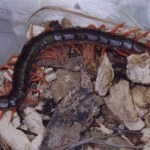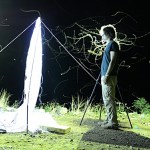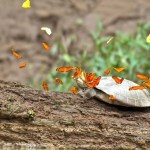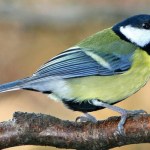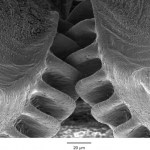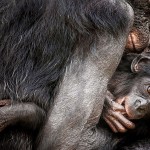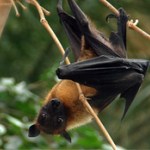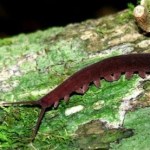Life Science
Image of a Chinese red-headed centipede from Wikimedia Commons.
Researchers from the Chinese Academy of Sciences and The University of Queensland have discovered a venom from centipedes capable of blocking pain more effectively than morphine!
According to the study authors, centipedes have appeared in the fossil records as far back as 430 million years. They are also one of the first land-dwelling creatures to use venom to incapacitate their prey as shown in the image above of a Chinese red-headed centipede (Scolopendra subspinipes mutilansis) snacking on a roach. The venom is…
Eran Levin in front of a blacklight screen.
Eran Levin, a postdoctoral researcher at the University of Arizona studies Hawk Moths. He used a technique called backlighting to catch them and in the process catches numerous other insects as well.
Moths navigate by keeping bright objects like the moon and stars at a constant angle. It turns out that artificial light disrupts the moths's detection of moonlight. They end up using the artificial light source as a navigation cue and as a result wind up circling the light bulb to keep it at a constant angle.
Check out his blog entry in Scientific…
Amazonian butterflies drinking turtle tears.Image from: Jeff Cremer / Perunature.com
The Amazon region is notoriously deficient in sodium because of its large distance from the ocean and because the Andes mountains block the delivery of windblown minerals from the West. Some minerals travel from the east, but much of the air is cleaned by rain before the minerals can make it to the western region of the Amazon Basin.
So if you were a butterfly, where would you find a readily available source of salt in the Amazon? The answer is not very obvious, unless you look at the photo of a yellow-…
This was just too cute (and funny!) not to share. I came across a blog in Scientific American that discussed a "standardized test" created by Hannah Bonner, illustrator and children's writer, to help determine whether someone (or some creature) is a mammal:
Excerpt from "When Dinos Dawned, Mammals Got Munched, and Pterosaurs Took Flight"
The test is part of her book called "When Dinos Dawned, Mammals Got Munched, and Pterosaurs Took Flight." What a great educational tool. It is published by National Geographic Children's Books. Kudos to you Hannah!
Source:
Scientific American
...for rodents and men at least.
A team of researchers at UC Berkeley have discovered that mice infected with the parasite Toxoplasma gondii lose their innate fear of cats, even months after the infection is cleared. In fact, infected mice were mildly attracted to the odor of cats. This side effect likely evolved because the parasite can only sexually reproduce in a cat's gut necessitating ingestion of the parasite. Incidentally, other researchers have described the same side effects in rats and men (but not women). The findings suggest that the parasitic infection causes permanent…
Image from: 41 ACTION NEWS KSHB.COM
Image from: Myfoxdetroit.com
Outlandish stories about a 25-pound Savannah cat, known as "Chum", on the loose in Detroit (above) may have been responsible for his untimely death last month. The 3-year old cat was owned by a local family but was spotted roaming the neighborhood. Neighbors mentioned calling Animal Control and the Detroit Humane Society, whom they say did not respond.
Savannah cats are considered exotic and are a cross between domestic and African serval cats. Chum was approximately 2 feet tall when sitting. However stories would…
Image of male great tit from BBC Nature News.
A new study published in Ecology Letters suggests that shy male great tits build stronger bonds with birds in their own flock. This population of birds has been studied in Wytham Woods, near Oxford, UK since 1947.
In case you are wondering, the team determined "shyness" and "boldness" by capturing birds and placing them in a novel environment for 10 minutes. Shy birds were slow to explore the new environment whereas bold birds explored it quickly. The birds were then tagged and tracked using radio transmitters. The researchers…
Image from www.123rf.com
A new study published in the American Journal of Physiology presents data suggesting that birds do not carry a specific anti-inflammatory protein critical for keeping inflammation under control in mammals, reptiles and amphibians.
The specific protein is tristetraprolin (TTP). It functions mainly by inhibiting key mediators of inflammation in the body, such as tumor necrosis factor alpha (TNFa). In fact, mice that are missing this protein have chronic systemic inflammation from unchecked TNFa. Moreover, mice missing the protein specifically in myeloid cells develop…
Image of young planthopper by study author Malcolm Burrows.
Scientists have discovered what they believe is the first example of interacting gears in young planthopper insects, Issus coleoptratus. The gears are on the upper portion of the insect's rear legs and help ensure the legs work in unison when the insect jumps. These gears are lost as the animal ages and are thus rather like training gears.
Image of functional gears on the hind limb of a plant-hopping insect from study author Dr. Malcolm Burrows.
Dr. Malcom Burrows (Emeritus Professor of Neurobiology at the University of…
233,000 gallons of molasses has leaked from a pipeline near the shore of Honolulu suffocating thousands of fish. The pipeline is used to load molasses onto ships. Officials have warned people to stay out of the water as sharks may be attracted to the area. The Hawaii Department of Health is working on removing the dead fish and cleaning up this environmental disaster.
I came across this video showing thousands of migratory birds circling the Tribute in Lights yesterday. The birds were migrating along the Atlantic Flyway and were disoriented by the lights. Other birds may have been attracted to the large number of insects and smaller birds caught up in the lights as prey (Cornell Lab of Ornithology). To reportedly help re-orient the birds and prevent exhaustion, volunteers from the NYC Audubon turned off the spotlights temporarily.
Video taken by: Shervin Pishevar
The lights are xenon searchlights in lower Manhattan arranged by artist Gustavo Bonevardi to…
You have to see this to believe it. This video from CNN shows how a 31-pound cat is losing weight by walking on an underwater treadmill.
I wonder how they were able to get this cat to even stay in the water. I think my cat would lose more weight in the process of fighting to stay out of the water. I would also have to buy A LOT of bandaids before attempting it. In fact, I am pretty sure the cat in this YouTube video "saying no" to a bath is a close relative of my cat:
Image of bonobos from www.freewallpaperspot.com
Photographer Graham McGeorge has captured remarkable images of bonobos, our closest living relative that share 98.7% of human DNA. The photos depict bonobos engaging in similar behaviors as humans, like the image above from another photographer of bonobos embracing each other. McGeorge also captured images of bonobos caring for their young as well as a bonobo who lost his hair with advancing age. Truly a must-see!
Click here to view images from this touching display.
Scientists at the Smithsonian National Zoo have now confirmed that the new panda bear cub born on August 23rd is a girl and Tian Tian is her father.
Image of Indian Flying Fox from Wikipedia, Fritz Geller-Grimm
An ambititous project seeks to identify all unknown viruses in mammals to determine the relative risk of infection to humans and to develop strategies to prevent and treat infections before they become pandemics. The pioneering research team is led by Dr. Simon Anthony at Columbia University and Dr. Peter Daszak from EcoHealth Alliance.
The team started by looking for viral infections in the Indian flying fox (Pteropus giganteus), a species with pathogens known to transfer to humans (Nipah and Hendra viruses). Over five…
A virus is to blame for the deaths of hundreds of bottlenose dolphins along the East Coast of the United States:
Dr. Pierre Legagneux (University of Quebec in Rimouski, Canada) and Dr. Simon Ducatez (McGill University, Canada) published a new study in Biology Letters suggesting that birds judge the speed limit of cars to determine when to take flight. In areas with higher speed limits, birds were observed to take off sooner than areas with lower posted speed limits.
Birds Adapt to Posted Speed Limits by GeoBeats
Image of panda bear cub at its first exam from the National Zoo.
Exciting news from the Smithsonian National Zoological Park! Mei, a giant panda bear at the zoo has given birth to a cub weighing in at 137 grams (~4.83 ounces)-too cute!! DNA tests will determine the sex as well as the paternity of the panda cub, which is either Tian Tian from the National Zoo or Gao Gao from the San Diego Zoo.
You can follow the Twitter feed from the Smithsonian here: #cubwatch in additon to checking out the live panda cam at the zoo.
Image of velvet worm from: Oliveira et al / Zoologischer Anzeiger
A new species of velvet worm (Eoperipatus totoros) is the first to be described from Vietnam after its discovery in 2010. This 2.5 inch long worm is distinguished from other velvet worms by hairs with unique shapes that cover its body. These animals are difficult to find and study because they are usually hiding in the moist soil to prevent dehydration. However, during the rainy season, they exit the soil and can be spotted. What is neat about these worms is that they hunt by spraying a glue-like…
In honor of Maine Lobster month, this video from the American Chemical Society describes why lobsters always turn red when they are cooked, regardless of what color they were prior to being dropped into the stock pot. I don't know about you, but this video has made me crave lobster for dinner tonight!
Follow Dr. Dolittle on Twitter: @DrDoScienceBlog
